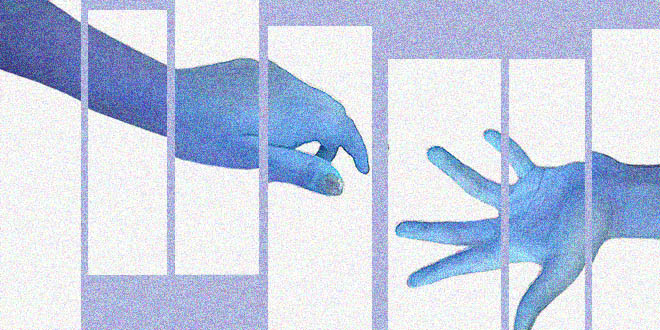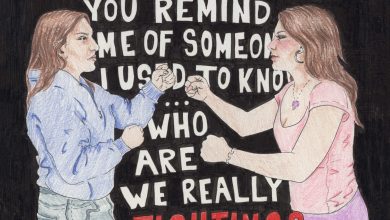Reconstructing Ally Politics (and the Ally-Industrial Complex)

Illustration by Katherene Quiteno.
The term ‘ally’ (noun) is traditionally defined as a person or group associated with another by reason of a common cause or purpose. Conventional synonyms include ‘supporter’ or ‘helper.’ Yet these descriptions are at best ambiguous; worse, the notion of championing others based on a supposed shared intention depicts the often praised – but in reality, the consistently inadequate and exploitative – role of an ally, especially in regards to social justice. Here’s why the concept of an ‘ally’ can be problematic – and the way a shift in our language and behavior can revitalize the campaign for equity.
1. Ally politics reduce our ability to think and act as individuals
The fundamental theory underpinning ally politics is that one must relinquish their position as an active and/or passive perpetrator of discrimination, a role that one occupies on account of preserving one or more social privileges they have been granted at the expense of their marginalized peers. In doing so, an alleged ‘good ally’ then abides by the direction of the most prominent subgroup of oppressed individuals, based on the understanding that they themselves will never know what it is like to navigate the world persecuted and/or repressed in this particular way.
2. There are multiple viewpoints and inclinations among people of an expressed identity
Despite the superficially positive shift from actor to ally, this approach is principally undermined by the existence of conflicting desires within a group adopting a distinct identity. There are two resulting risks; they are not mutually exclusive. One peril is enabling a small group of authoritarian figures at the top of the identity hierarchy to dictate the specific ideologies an ally should support, implying those who do not even hold power amongst their peers are less worthy of backing.
For example, Hollywood has faced criticism from the likes of Jennifer Lawrence for the glaring wage gap between men and women in the film industry. Similarly, Amy Schumer and Seth Rogen co-starred in an advertisement in which Rogen affirmed, “Women don’t get paid as much as men and that is wrong,” echoing the sentiments of Schumer regarding the salary differential and notorious “tampon tax.” However, the emphasis on equal pay ignores the comparative absence of women of color in the types of roles leading to compensation anywhere near that of even Lawrence or Schumer. As Viola Davis pointed out in her Emmy acceptance speech, one can neither win – much less get paid for – opportunities that do not exist. Accordingly, Schumer, Lawrence, and Rogen – their ally – decline to note the importance of the intersections creating an issue more complex than just a gender gap in salary, but also an initial race-based chasm in representation on the silver screen.
Likewise, the second danger lies in giving up one’s ability to critically analyze the nuances and intersections inherent in a situation of oppression. Instead, one acts as a mouthpiece for the token segment of the community whose views most closely align with their own beliefs. The ensuing reduction in accountability and espousal of self-selected theories regarding the repression – thereby occupying the space of individuals who actually bear and can speak to this burden – further hamper potentially well-intentioned efforts to effectively advocate with one’s peers.
3. The ally industrial complex leads to profits in the name of effecting change
The construct of the ally industrial complex expands on the above shortcomings. At its core are the activists who build careers, nonprofit and grassroots organizations, and ultimately the capacity and capital to become the ostensible defenders of the oppressed. In doing so, the concept of being an ‘ally’ commodifies and manipulates a cause for personal gain and the self-assured belief that one is nonetheless a ‘good ally.’
In truth, to be a ‘good ally,’ one cannot appropriate the struggle against a form of oppression as their own mission. Because of this misconstrued impression of an ‘ally,’ the term ‘accomplice’ is put forth. To transition from an ally to an accomplice, Indigenous Action Media maintains one must still take a complicit role in fighting injustice.
The words “accomplice” and “complicit” may initially evoke negative implications, perhaps in reference to behavior that is against the rules of a system. That may be true. The use of these particulars captures the gravity of the institutionalized prejudice to be overcome – in short, an accomplice must be willing to sacrifice if they are sincere in their support of a cause. In the context of ally politics, one must truly be willing to give up their privilege – albeit not their means of influence. This agency becomes the energy to resist beside one’s cohorts, to hear each of them, and to abolish the configurations of current relationships and hierarchies in pursuit of universal freedom.
Instructing one another on the ways in which we are racist, sexist, homophobic, transphobic, etc. simply reinforces the self-righteous conduct and power-oriented behavior that led us to our currently inequitable world. There are other means of organizing against oppression; these strategies continue to evolve, and more of them are needed.
1. Creating an inclusive and productive safe space
For instance, one can sponsor workshops where those who do and do not have a certain form of privilege discuss how this privilege – or lack thereof – has shaped their lives and collaborate to address the concerns of individual stakeholders. Key to progress is approaching the inequity in question by endorsing responsibility rather than emphasizing blame.
2. Recognizing power and money are the foundations of contemporary society
Breaking down gender, race, sexuality, and other identities into an analysis of their central power dynamics is paramount to grasping the role of broader societal structures in maintaining oppression. As such, one may gain a better understanding of the complexities within and ambitions of social justice movements.
Becoming effective accomplices rather than compliant “allies” is a challenge we must all accept in order to progress towards empathy and liberation.




